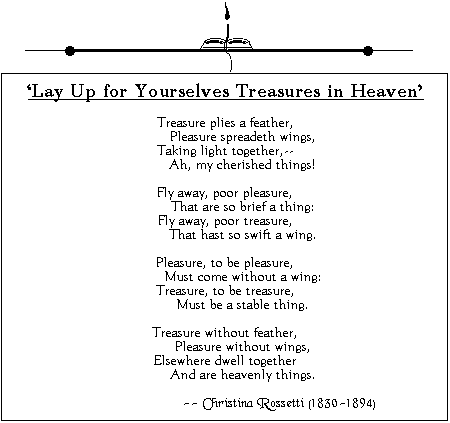[
Home | Table
of Contents | Previous Page | Next
Page | Back Issues | Complete
Index ]

A New Testament Study - Philippians 3:7-9a
We continue here our study in the Epistle to the Philippians.
Profit and Loss
7But whatever was to my profit I now consider
loss for the sake of Christ. 8What is more, I consider everything
a loss compared to the surpassing greatness of knowing Christ Jesus my Lord,
for whose sake I have lost all things. I consider them rubbish, that I may
gain Christ 9and be found in Him . . .
"Here are the sweet strains of a gospel spirit, letting
out itself in expressing a dear love to, a high esteem of Christ, and Him
alone; advancing Christ above all, giving Him the throne, and making all
competitors His footstool."[Footnote #2] In the previous passage, Paul
just finished enumerating his qualifications (from a worldly point of view)
to have confidence before God in his own works: "If anyone else
thinks he has reasons to put confidence in the flesh, I have more: circumcised
on the eighth day, of the people of Israel, of the tribe of Benjamin, a
Hebrew of Hebrews; in regard to the law, a Pharisee; as for zeal, persecuting
the church; as for legalistic righteousness, faultless." (Phil.
3:4-6). However, here in verses 7 through 9, Paul tells us how he views
such works of the flesh now that he has come to know Christ. He begins:
"But whatever was to my profit I now consider loss for the sake
of Christ." Paul has changed. Saul has become Paul. Paul used to
consider his qualifications of the flesh--his lineage, his inherited religion,
his works of righteousness--as "profit", now he considers
them "loss". "Paul cast off the world, and the world
cast off him; he disregarded the world, and the world disregarded him; he
was dead to the world, and the world was dead to him. The world and Paul
were well agreed; the world cared not a pin for Paul, and Paul cared not
a straw for the world."[Footnote #3]
We (properly) gain a different perspective when we come to Christ. As the
hymn says, "The things of the world will grow strangely dim."[Footnote
#4] We count loss what the world counts gain; we count gain, what the world
counts loss. The world values the material; we value the spiritual. The
world strives for fame; we strive to serve God. The world seeks after monetary
fortune; we seek to know Christ. Such a perspective is normal for the child
of God, but abnormal for the world. "By this you may know the truth
of your esteem, when Christ and other things which you have formerly valued
come in competition, which of these gets the place? If you had rather displease
Christ than cross your humours, rather dishonour him than decline your worldly
interest, rather offend him than abate of your pleasures, rather hazard
the loss of his favour than lose an outward advantage, oh your esteem of
Christ is little or nothing; it is not such as will afford you assurance
that Christ is come in. If he be in you, your esteem of other things will
decrease, your esteem of Him will increase, it will overgrow, overshadow
all; that which others reject will be head of the corner, elect and precious
to you that believe."[Footnote #5]
So, concerning all the things that Paul used to boast in, he now says: "But
whatever was to my profit I now consider loss for the sake of Christ."
These things that Paul now "consider[s] loss for the sake of Christ"
were not entirely intrinsically bad things. Of the attributes that Paul
boasted in, which he listed in verses 5 and 6, all were commendable, except
(of course) for persecuting the church. It is not that these things had
lost their value; it is just that Paul had found something much more valuable.
"A worldly man looks upon all things below his earthly portion as contemptible;
and so doth a Christian look upon all things below his God as contemptible."[Footnote
#6] As Paul puts it: "What is more, I consider everything a loss
compared to the surpassing greatness of knowing Christ Jesus my Lord, for
whose sake I have lost all things." When one finds gold, tin loses
its lustre in one's eyes.
To know Christ is "surpassing greatness." Paul traded the
things of the world for "the surpassing greatness of knowing Christ
Jesus [his] Lord", and certainly came out ahead on the deal. Moses
did the same thing. "By faith Moses, when he had grown up, refused
to be known as the son of Pharaoh's daughter. He chose to be ill-treated
along with the people of God rather than to enjoy the pleasures of sin for
a short time. He regarded disgrace for the sake of Christ as of greater
value than the treasures of Egypt, because he was looking ahead to his reward"
(Heb. 11:24-26). What do you love more than Christ? What's turning your
thoughts away from Christ and to the world? What's hindering you from the
"surpassing greatness" of knowing Christ? Give it up. Whatever
you lose will be to your profit. You will be on the advantage side of a
great trade.
Paul considered "everything" that he gave up for Christ
not only as useless, but as detrimental: a "loss". The
things of the world are a "loss" to us when they hinder
us from coming to Christ, or from knowing Christ more fully. We must be
careful, lest our blessings turn out to curse us. Many of us have heard
stories about the lottery syndrome, when great financial blessing ruins
lives, breaks up families, and entrenches the recipients into moral depravity.
Paul here is specifically speaking of the "loss" that his
confidence in the flesh caused. Paul's commendable attributes--his circumcision,
his ancestry, his morality, his zeal, his legalistic righteousess (see vss.
5,6)--became detriments because they hindered him spiritually. Rather, than
these commendable attributes drawing him to God, they made him self-righteous,
causing him to ignore his need for the salvation that comes from God. Those
who are self-righteous feel that they do not need Christ for their salvation.
Arrogance and self-sufficiency are sure signs of the absence of Christ in
one's life. Those who know Christ, know that they need Him desperately.
Note that the surpassingly great knowledge that Paul is speaking of is not
a mere passing knowledge or a mere intellectual acknowledgement (even demons
have that, cf. James 2:19), but is "knowing Christ Jesus my Lord."
It is first knowing "Christ": the Messiah, the mediator
sent by God. It is then knowing "Jesus": God as man, coming
into the world and dying for us as our Savior. And, it is also knowing "my
Lord": the recipient of our praise and worship, our Master, in
whom we put all trust and obedience. Note also, it is "my"
Lord, implying a personal knowledge and relationship, an appropriation to
oneself of Christ as Lord. Such a knowledge necessarily affects one's life.
Paul's knowledge of Christ was certainly not merely theoretical but also
effectual: it gave him a contempt of all things as compared to Christ, "for
whose sake [he] lost all things." Paul did lose for the sake of
Christ all that he previously valued: his standing as a Pharisee, the respect
of his peers, even his freedom (he was in chains as he wrote these words).
But, again, such a "loss" was not some noble self-sacrifice,
for Paul gained the greatest prize, that of the "surpassing greatness
of know Christ Jesus [his] Lord."
And so Paul lost "all things", but really nothing, for
he says: "I consider them rubbish, that I may gain Christ and be
found in Him." "`All things' is the greatest account
that can be cast up, for it includeth all prizes, all sums; it taketh in
heaven, it taketh in the vast and huge globe and circle of the capacious
world, and all excellencies, within its bosom. `All things' includes
all nations, all angels, all gold, all jewels, all honours, all delights,
and everything else besides; and yet the apostle looks upon all these things
but as ["rubbish",] `dung', dogs' dung, as some interpret
the word, ...coarse and contemptible, in comparison of dear Jesus."[Footnote
#7] When a person comes to a deep knowledge of Christ, he discovers that
the things he once so thirsted, are like rubbish to him. As Christ said:
"Whoever drinks the water I give him will never thirst" (John
4:14).
Paul had two goals in giving up all things: that he may "gain Christ"
and "be found in Him". To "gain Christ",
is (first) to gain salvation through Christ, and then also to gain the fulfillment,
satisfaction, purpose, peace, etc. that comes from knowing Christ. To "be
found in Him" denotes two things. First, it denotes being found
in Him spiritually: to be in His body, united to Him, with His desires being
your desires. Second, it denotes being found in Him judicially, that is,
found in Him on judgment day: justified, sanctified, clothed with His righteousness.
Certainly, to be found in our own righteousness at God's throne on judgment
day would be insufficient for salvation. Not only Paul, but God considers
our own righteous works as "rubbish", as far as contributing
to our salvation. As Isaiah says: "How then can we be saved? All
of us have become like one who is unclean, and all our righteous acts are
like filthy rags" (Isa. 64:5,6). God would as readily accept "rubbish"
for salvation as He would our own righteous works. But we have Christ. Praise
be for that!
Lord, we praise You that we do not have to depend on ourselves for our salvation,
but that we can depend on the righteousness of Christ. May we be able to
rightly evaluate the rubbishness of the world, as compared to knowing and
serving Your Son. Help us by Your Spirit to know Him better, to serve Him
more effectively, and to love Him more fully. In His precious name we pray,
Amen.
(Due to a special issue next month, our study of Philippians
will continue in two months.)

Footnotes:
2. David Clarkson, The Excellent Knowledge of Christ, from The
Works of David Clarkson, Vol. I; pg. 245.
3. Thomas Brooks, An Ark for All God's Noahs, from The Works of
Thomas Brooks, Vol. II; pg. 95.
4. Helen H. Lemmel, from "Turn Your Eyes upon Jesus".
5. David Clarkson, Christ's Gracious Invitation to Sinners, from
The Works of David Clarkson, Vol. II; pg. 93.
6. Thomas Brooks, op. cit., pg. 94.
7. Thomas Brooks, Seven Inferences from the Consideration of the Great
Sufferings of Christ, from The Works of Thomas Brooks, Vol. V,
pg. 209.
[ Home | Table
of Contents | Previous Page | Next
Page | Back Issues | Complete
Index ]


